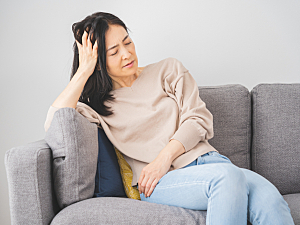A 1959 paper in the Journal of the American Medical Association described menopause as a “rather unpleasant and possibly dangerous” period of life and presented what became the first widely used checklist of menopause symptoms.
Hadine Joffe, MD, MSc, interim chair of the Department of Psychiatry at Brigham and Women’s Hospital and executive director of the Mary Horrigan Connors Center for Women’s Health and Gender Biology, and colleagues recently undertook a rigorous scientific review of whether menopause is associated with depression, anxiety, psychosis, suicidality, and other mental health disorders, as has been reported.
They present their conclusions in The Lancet along with recommendations for promoting good mental health over the menopause transition, which starts with the onset of menstrual changes and ends with the final menstrual period.
Links Between Menopause and Mental Health Disorders
The team searched for relevant prospective studies in MEDLINE, Embase, and PsycInfo from January 1, 1990, to July 1, 2023. Their key findings:
- Major depressive disorder (MDD)—Of 12 studies of the association between the menopause transition and depression, only two (n=611) established a full diagnosis of MDD based on clinician interviews. The results of those two studies suggest the menopause transition is a vulnerable period for the recurrence of MDD but not for first lifetime onset.
- Depressive symptoms—Four studies showed that for women without previous MDD, the absolute risk of subthreshold depressive symptoms (not a full episode of MDD) is not markedly elevated over the menopause transition. Notably, there are some individuals who appear to be at risk for depressive symptoms—those with severe and prolonged vasomotor symptoms, chronic sleep disturbance, and important life stressors (e.g., health concerns and role transitions).
- Anxiety—One study measuring anxiety disorders found no increase during the menopause transition, and four studies found no consistent evidence that anxiety symptoms increase. However, somatic anxiety (anxiety perceived through physical symptoms such as racing heart) seemed to predict moderate or severe vasomotor symptoms, so reducing anxiety might reduce bother from vasomotor symptoms and is a potential target for intervention.
-
Bipolar disorder and psychotic disorders—No prospective studies have investigated psychiatric symptoms over the menopause transition in people with bipolar disorder, and none have examined rates of new-onset or recurrent episodes of schizophrenia or other psychotic symptoms or disorders.
-
Suicidality—The team found no substantial evidence the menopause transition is associated with an increased risk of suicide. However, for unknown reasons, some evidence suggests that the use of menopausal hormone therapy is associated with suicide attempts, possibly because HT is being used in women with mood disturbance who have an underlying risk of suicidal ideation.
Optimizing Mental Health at Menopause
Clinicians should not automatically attribute depressed mood or other mental health symptoms to menopause. This assumption creates negative expectations that reinforce stereotypes about menopause and aging.
For people at risk of depressive symptoms over the menopause transition, it may be beneficial to address modifiable risk factors such as sleep disturbance, bothersome vasomotor symptoms, and stressful life events.
The evidence does not support using menopausal hormone therapy as the primary approach to preventing or treating depressive symptoms, MDD, or anxiety. On the other hand, cognitive behavioral therapy is a proven intervention for these disorders as well as for sleep disturbance and vasomotor symptoms.
Most research on mental health and the menopause transition involved women, and it remains to be clarified how these findings might apply to the needs of trans men and gender diverse people.
